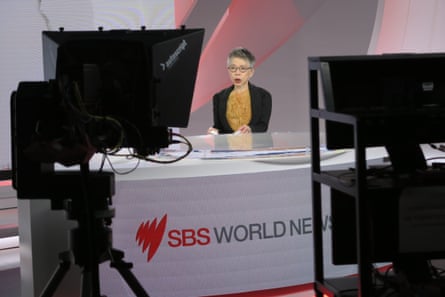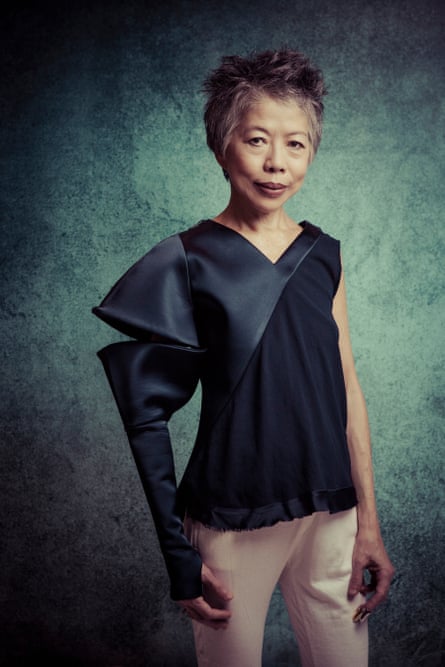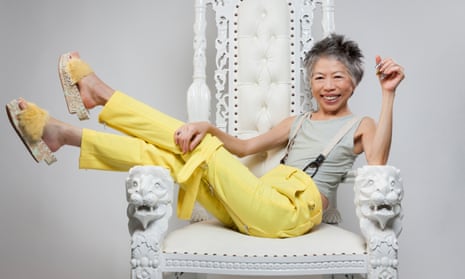Lee Lin Chin did not disappoint.
Throughout her career, her fashion choices have become appointment viewing on Australian television – from her latticed metal sunglasses announcing Australia’s first Eurovision scores to her daffodil yellow slacks and suspenders with ruby slippers at the 2015 Logies. Her outfit for her final broadcast for SBS World News on Sunday night was always going to be an event.
In an industry where most on-screen talent are discouraged from wearing stripes to avoid visual distraction, a reflective body wrap of transparent black plastic was the Chin-est possible choice.
Dear @LeeLinChinSBS - you've been a precious gem on the media landscape. Enjoy your next big adventure #leelinchin pic.twitter.com/R5P0vM7TZd
— Kaye Sera (@MissKayeSera) July 29, 2018
It’s a grave disservice to anyone to define their contribution to their industry by their ethnicity – or indeed, their fashion choices – but as one of the still-all-too-few Asian faces in Australian media today I will forever be grateful to trailblazers like Chin. She has been an example of diversity and excellence in a field where they are so often lacking.
For decades she was the only regular Asian face on Australian television – a shameful statistic for an industry that has kept Asian Australians largely off its screens throughout its more than 60-year history. The label of “pioneer” is one I know sits uncomfortably with the woman herself, but the symbolism of her position to young Asian Australians of my generation and beyond should not be understated. She was one face that resembled our own among a sea of those who ignored us. I thank her for it.
But it was not her ethnicity, her eye for fashion, her cult status or pioneering position that made Lee Lin Chin a beloved household name. Simply, she was and continues to be a damn fine broadcast journalist.

The World News is a different beast to a commercial news broadcast. It covers events that are literally world-changing, with less of the dog-bites-man that local news can afford. There’s none of the white-noise back-and-forth banter between newsreaders to editorialise the events of the day. Chin explained happenings around the globe on a nightly basis, and did so alone – one woman against the world.
Her style was one of a firm hand on the tiller, guiding us through stories with feeling but without panic or alarm – a reassuring voice amid news that was often anything but. Mention Chin’s name and millions of Australians can easily imagine her deliberate, powerful tone.
Our newsreaders hold a rare responsibility in our lives. Night after night they explain the happenings of the world around us. In Chin’s case she did this not just for weeks, months and years, but for entire generations of Australians. My late grandmother watched Chin, as did my parents. I watched her too, and so did my children.

Newsreaders become part of our household furniture, but by virtue of their profession they can offer us little of themselves. For Chin, the contrast between the stoic professionalism of her delivery and the distinctive flamboyance of her appearance was more than an affectation. It gave life and character to the news she read, and a sense that although the news may be facts at large, we each receive it as individuals.
Later in her career, stints on SBS Viceland’s The Feed gave a comic turn to her reputation as a grande dame of Australian media. The skits, and her tongue-in-cheek self-help book written in collaboration with comedian Chris Leben, gave audiences a peek behind the curtain at what they had long known about Chin – that behind her elaborately spectacled professionalism lay a sharp tongue, a dry wit and an inability to suffer fools.
The first time I met Chin in person was in Canberra on one of our frequent SBS trips to the capital to thank our elected representatives for their continued support for public broadcasting. Later in the evening we found ourselves propping up a hotel bar in the company of a local Canberran offering his impassioned views on some subject that I can’t have cared enough to remember.
Without saying a word, Chin walked away and stood some distance apart.
I politely chatted for another few minutes, then excused myself and followed her, asking her why she had left and she replied simply, “Because he wasn’t interesting.”
It has been nearly 50 years – almost as long as the history of television in this country – since SBS has broadcast without the voices of Lee Lin Chin or sports commentator Les Murray, who died exactly one year ago today. Chin is, of course, still with us and has defiantly scotched any talk of retirement.
Wherever she lands next, her legacy at SBS is unmatched. And without her voice the timbre of Australian television is forever changed.
